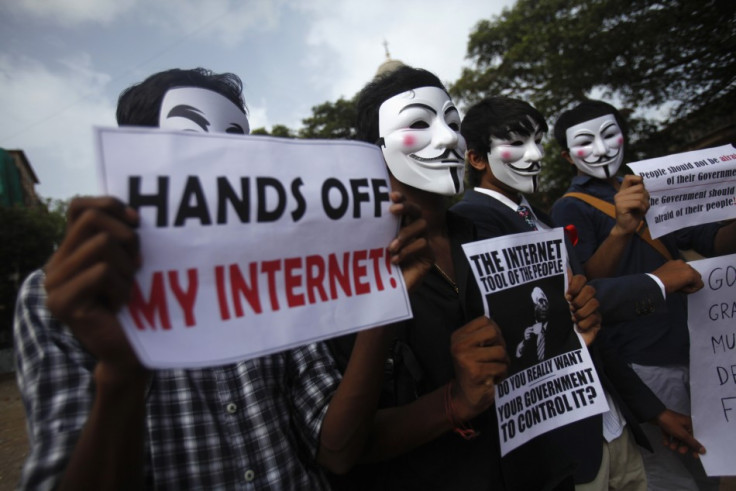OpIsrael: Israel Prepares to be 'Wiped Off the Internet'
Security experts are treating Anonymous threats to "wipe Israel off the map of the internet" as an annoyance rather than a significant threat to national security.

Those in charge of Israel's cyber defences, along with those charged with securing the country's internet infrastructure, have known about OpIsrael for more than a month and are well prepared, seeing it as more of a challenge of their security credibility than anything more serious.
As Israel prepares to mark Holocaust Memorial Day on 7 April, the country is also facing what has been described as the "largest Internet battle in the history of mankind" which promises to "wipe Israel off the map of the internet."
The attack, under the OpIsrael banner, has been organised by a group of hackers who are loosely affiliated with the online hacktivist collective Anonymous. This weekend's planned cyber-attack on government, banks, academic and business websites is a follow-up to a similar attack launched last November.
In response to "thousands of bombs" being dropped on the Gaza Strip, Anonymous launched OpIsrael last November and claimed that within hours "there were thousands of defaces and hacks, databases released or deleted, dozens of disruptions to government sites and more."
The second wave of OpIsrael was initiated a month ago, with a press release from the group behind it this week addressing the Israeli government:
"You have NOT stopped your endless human right violations. You have NOT stopped illegal settlements. You have NOT respected the ceasefire. You have shown that you do NOT respect international law. This is why that on April 7, elite cyber-squadrons from around the world have decided to unite in solidarity with the Palestinian people against Israel as one entity to disrupt and erase Israel from cyberspace."
No stranger to attacks
However Israel is no stranger to cyber-attacks. Last November the Israeli foreign minister Yuval Steinitz revealed that it has faced 44 million cyber-attacks since the beginning of its military operation in Gaza.
Of all these attacks, just one was partially successful, knocking one website offline for a short period.
"We are reaping the fruits on the investment in recent years in the development of computerised defense systems, but we have a lot of work in store for us," Steinitz said at the time.
As well as boosting security around critical infrastructure, the Israel Internet Association (ISOC) is preparing to deal with issues suffered by ordinary citizens during the attack and it has even set up a hotline for people to contact if they notice any problems.
We recently saw what is described as the "largest cyber-attack in the history of the internet" had a knock on effect on internet users when a single data centre was flooding with up to 300Gbps of data.
Not very sophisticated
The OpIsrael attack is very likely to consist of a series of cyber-attacks called distributed denial of service (DDoS) attacks, which aim to use large networks of computers working together to drive huge amounts of traffic to the servers hosting the target websites.
These attacks are not very sophisticated and aside from potentially knocking websites offline for some time, have little lasting effect on the servers and websites in question.
Lior Tabansky, a fellow at the Yuval Ne'eman Workshop for Science, Technology, and Security of Tel Aviv University, told the Times of Israel that DDoS attacks are the only weapon available to these attackers:
"Unless they have names and passwords, [DDoS] is really their only attack strategy. Unfortunately, there is little a company can do to stop it, but it is not the major cyber-threat many people, especially in the media, believe it to be. It's more of an annoyance, and if they do manage to intimidate sites into submission, the victory will be one of public relations."
Mossad
However an alleged cyber-attack carried out last month could indicate that these groups have more than just DDoS at their disposal.
Hacktivists associated with Anonymous, a Turkish group called RedHack and an Arab group call Sector404 declared they had managed to breach the defences of Mossad, the Israeli secret service and steal the details of 30,000 secret agents.
The veracity of the leaked documents was quickly called into question, however, with many pointing out that Mossad was very unlikely to have 30,000 secret agents, considering the entire Israeli military has about 175,000 personnel in total.
Those organising this attack come mainly from northern Africa, along with some from Turkey. Identifying where these attacks may come from is key to mitigating the effect of these attacks. Hosting companies could decide to block IP addresses based in North Africa for the duration of the attack, meaning any traffic coming from that area would have no effect.
"The really important sites are protected from the public Internet, and the chances that the hackers can penetrate them are next to nothing," Tabansky said.
"Over the past weeks, site administrators in government and the private sector have been shoring up their defences, making it much harder to guess passwords and invade sites. So it's unlikely we'll see that type of activity."
© Copyright IBTimes 2025. All rights reserved.






















